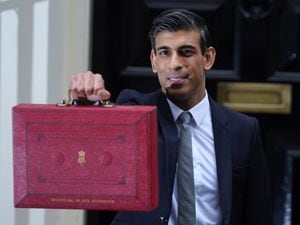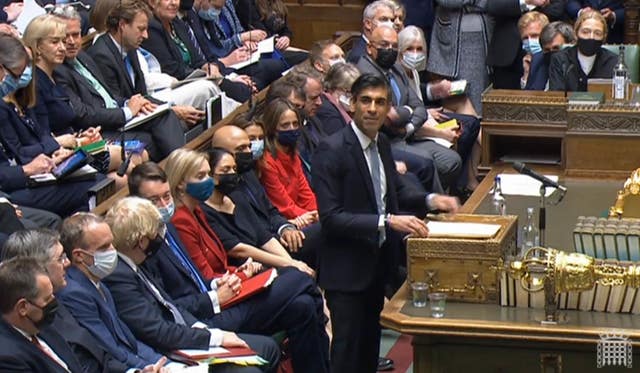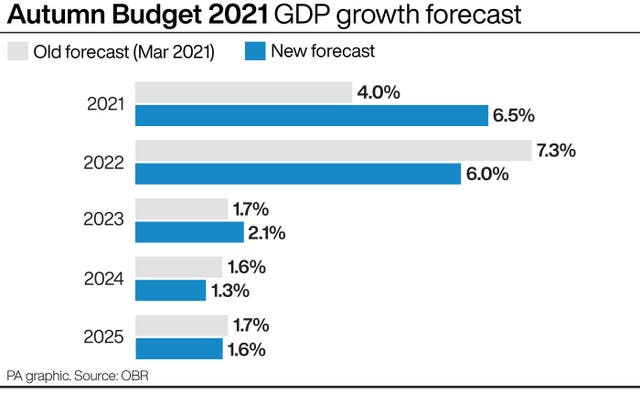Budget transport and housing funding 'will help level up West Midlands'
The Budget has "delivered on levelling up" and will fast track the West Midlands' economic recovery from Covid, according to the region's mayor.

Andy Street said the Chancellor's spending plans "will make a real difference to people’s lives" across the region after "serious amounts of cash" were pledged for transport, housing and skills.
The Budget saw Wolverhampton awarded £20 million for its city learning quarter, while Cannock has received the same amount for a new town centre cultural hub and the refurbishment of the Prince of Wales Theatre.
The region received more than £1 billion in transport funding for schemes including the Wednesbury to Brierley Hill Metro extension, as well as cash to regenerate old industrial sites for housing and a new adult numeracy skills programme.
Nationally, Rishi Sunak pledged a major increase in public spending, tax cuts for businesses, and investment to create a “new economy” based on high skills and wages following the pandemic.
After widespread condemnation of the decision to cut £20 a week from Universal Credit, Mr Sunak set out plans to reform the benefit to enable claimants to earn more without losing as much of it – a measure he claimed amounts to a £2 billion tax cut for the lowest paid.
But Labour hit out at the package of measures announced by the Chancellor, which will cut the price of a bottle of Champagne and slash taxes for banks.
West Midlands Mayor Mr Street, said: "After an incredibly challenging 18 months, the Chancellor has today delivered a budget that will make a real difference to people’s lives in the West Midlands.
"I am delighted that he has by put serious amounts of cash on the table for our three biggest priorities – public transport, brownfield land remediation, and skills and training.
"What this means is we can better connect our communities with new metro lines, train stations, and rapid bus routes; build more homes that are truly affordable whilst protecting precious greenbelt land; and help train people across the West Midlands with the skills they need to secure the good-quality, well-paid jobs of the future.
“This is a budget that delivers on levelling up, and delivers on the needs of the West Midlands."
Mr Street said the "serious concerns" he had over the removal of the £20 universal credit uplift had been addressed by an eight per cent reduction in the taper rate that would "help keep more money in the pockets of workers across our region".
Wolverhampton South West MP Stuart Anderson, said he was "thrilled" that the Government had backed plans for the city learning quarter.
"Over a 10-year period, around 45,000 people will benefit from learning there," he said. "This will transform the prospects of young people in our city."
What was in the Budget and what does it mean for you?
Rishi Sunak has delivered his autumn Budget and Spending Review to the House of Commons.
Here is what was in it and what the headline announcements mean.
– Did we not already know most of what was in the Budget beforehand?
A good deal of policies were pre-briefed and the Chancellor received a scolding before his fiscal statement at the hands of Deputy Commons Speaker Dame Eleanor Laing as a result.
The rise in the minimum wage to £9.50 for those aged 23 and over, and the lifting of the public sector pay freeze were announced before Wednesday but there were other significant policy announcements in the speech.
– So what is new then?
Benefit claimants who work will be able to pocket more of their earnings thanks to the rate their support payments decrease being slashed, pub beer prices are being cut and a planned rise in fuel duty has been scrapped.
– What is this benefit change about?
The Universal Credit taper rate took on a new found prominence as the debate raged over the Government’s decision to remove the £20 weekly uplift that it brought in during the coronavirus pandemic.
Ministers, who scrapped the additional payment this month, argued claimants could replace the money by taking on extra hours of employment.
But it was pointed out that, for every £1 extra earned by UC beneficiaries, the taper rate meant their welfare was reduced by 63%, meaning they effectively take home just 37p in every pound.
Mr Sunak called it a “tax on work – and a high rate of tax at that” as he announced he would be lowering the taper rate to 55%, a drop of 8% that he said would be worth more than £2 billion when the change comes in no later than December 1.
– Can you tell us more about this cheaper booze the Chancellor mentioned?
Drinkers could well be cheering a Brexit boon after Mr Sunak said he was able to simplify alcohol duty rules due to leaving the European Union.
The Chancellor told MPs he was “radically” simplifying alcohol duty by introducing a system designed around the principle of “the stronger the drink, the higher the rate”.
The move is bad news for high-strength cider guzzlers, but will prove a saver for those partial to a glass of rose wine or lower strength beers.
Pubs were not left out either, with a 5% draught relief applied to pints of cider and beer poured out of containers over 40 litres. Mr Sunak, who is teetotal, said it would bring about a permanent 3p reduction in the cost of a pint.
The planned increase in duty on spirits, wine, cider and beer will also be cancelled immediately, while the wider duty reforms will come into effect by 2023.
– What were the other headlines?
Other announcements include cheaper domestic flights between airports within the UK due to a lower rate of Air Passenger Duty from April 2023 and business rate reforms, including a one year 50% discount for retail, hospitality, and leisure firms.
Overseas aid will go back up to 0.7% of national income in 2024-25 after it was reduced this year to 0.5% after the Government cited coronavirus budget pressures.

The UK’s devolved administrations will all receive increases to their Budgets, as will every Whitehall department following the Spending Review.
Local areas across the country are also set to benefit from the first batch of so-called “levelling up” funding, with £1.7 billion to invest in the “infrastructure of everyday life”.
– What happened to the economy being in dire straits – where is all this money coming from?
Mr Sunak was handed some welcome news from the independent forecaster the Office for Budget Responsibility (OBR) that the UK economy is bouncing back from Covid much quicker than it had predicted in the spring.
The OBR has revised its growth forecast for this year from 4% to 6.5% which is set to give the Treasury billions of extra pounds to splash.

The body has also scaled down its assumption of the scarring effect of Covid-19 on the economy from 3% to 2%, while the unemployment peak is expected to hit 5.2%, much lower than the 12% originally predicted.
Borrowing as a percentage of GDP is forecast to fall, from 7.9% this year to 3.3% next year, and tumbling further in the years ahead.
– So was there any pain dished out?
It would not be a Budget if there was not a bit of giving with one hand, taking with the other.
Mr Sunak has said inflation was “likely to rise further” from its position of 3.1% in September due to pressures caused by supply chains and energy prices, meaning further strain on household purses.
And the Cabinet minister suggested the Government would be reluctant to take an interventionist approach to support failing businesses or to counter market forces, telling the Commons: “Government should have limits.”
The comment comes on the back of record fuel prices, National Insurance Contributions for workers being increased by 1.25 percentage points from April to help pay for the NHS and social care, and the end of the £20-a-week Universal Credit uplift.
Property developers also face a new tax to pay for the removal of unsafe cladding, with Mr Sunak confirming a levy on firms with profits over £25 million at a rate of 4% to help create a £5 billion fund.
What do the Chancellor’s announcements mean for my household?
Rishi Sunak has delivered his Budget, including several policies that will give households both more and less money in their pockets.
Below are four topics that came out of the Chancellor’s announcements and how they might impact your wallet.
– If you’re on Universal Credit
If you are getting back into work but are still on Universal Credit, you could be left with a pretty big windfall.
Universal Credit starts to be phased out when you start earning again. For every £1 you earn, your Universal Credit was in the past cut by 63p.
This figure, known as the Universal Credit earnings taper rate, will be reduced to 55p, leaving you with an extra 8p per pound to spend.
– If your energy bills are going up
As shadow chancellor Rachel Reeves pointed out after his speech, Mr Sunak did not make any promises to help households with the runaway bills sparked by a spike in gas prices.
From April the price cap on energy bills is expected to rise to around £1,660 for an average household, from £1,277 today.
A Treasury paper acknowledged that European gas prices had risen by 471% in the year to September, but it did not announce any steps to reduce soaring gas bills.
– If you drive – or fly – within the UK
The price of petrol is likely to be lower after the Chancellor announced he was scrapping a planned hike in fuel duty.
Mr Sunak said he would freeze fuel duty at 57.95p per litre for the year ending March 2023. The decision comes after petrol prices pushed to their highest point in eight years late last week.
Controversially, days before the UN climate change summit in Glasgow, the Chancellor also said he would cut air passenger duty for domestic flights by 50% to £6.50.
– If you like a tipple
If fortified wine or high strength white cider are your thing, your drinks tab is about to go up. The Government will increase tax on these because of their high alcohol content.
But lower-alcohol drinks such as fruit cider, liqueur and rose wine will have lower taxes.
If you like craft cider you might also see your bills go down as small producers will for the first time be eligible for tax relief.
Draught beer served in pubs will also see a duty cut, the Chancellor said. The reforms will come into effect in February 2023.





